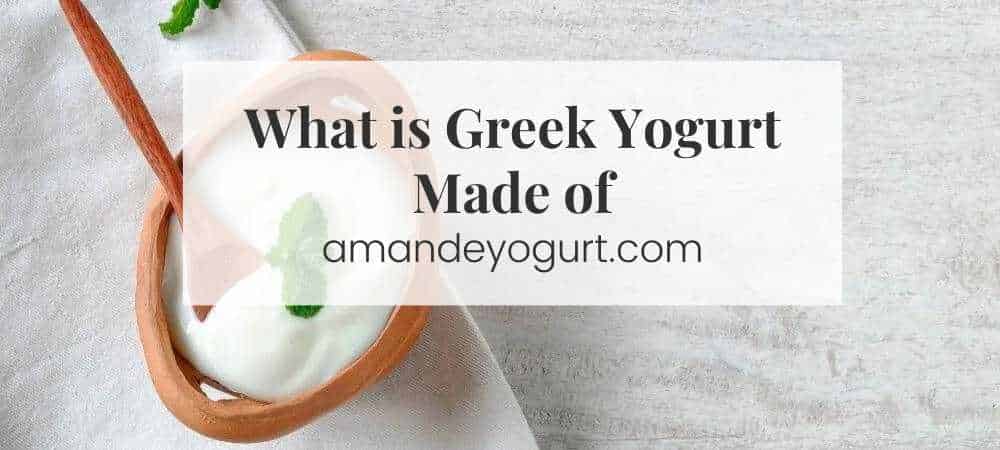Greek yogurt has become a favorite food item for many Americans. The creamy texture and tangy flavor make it a great snack or dessert option. But did you know that some Greek yogurt brands contain more lactose than others?
Lactose is an important consideration for many while consuming Greek Yogurt. Especially if you are lactose intolerant, it becomes necessary for you to know, “How Much Lactose in Greek Yogurt”?
| Do You Know, Lactose is a natural sugar found in milk and milk products? It has two components – galactose and glucose. |
In this blog post, we will find out the amount of lactose in a standard serving of Greek Yogurt. Also, we will explore how it impacts your health.
So, let’s get started!
What is Lactose Intolerance?
Lactose intolerance occurs when the body does not produce enough lactase enzyme, which breaks down lactose into glucose and galactose. It leads to symptoms like bloating, stomach cramps, diarrhea, etc.
The most common symptom is abdominal pain due to gas production. Some people experience nausea and vomiting as well.
The severity of these symptoms depends on the individual’s sensitivity toward lactose. If you have mild lactose intolerance, you may feel discomfort after eating dairy products. However, if you are severely affected by lactose, you could even be hospitalized.
What are the causes of Lactose Intolerance?
Lactose intolerance is caused when your body doesn’t produce enough lactase, an enzyme that helps you break down lactose, a sugar found in milk. People with lactose intolerance have trouble digesting milk because their bodies cannot produce the necessary enzymes to break down the lactose. (1)
Symptoms often begin within 30 minutes to two hours after consuming milk. These symptoms include gas, bloating, cramping, diarrhea, and pain in the abdomen. Some people also experience flatulence, nausea, vomiting, headaches, and fatigue.
Some people with lactose intolerance may not even realize they have a problem until they try to drink milk again after recovering from other illnesses.
How much lactose is in each serving of Greek Yogurt?
In 6 ounce serving of Greek yogurt, you get 4 grams of lactose which is considerably less than full-fat yogurt with 8.6 grams of lactose.
However, there is no official guideline regarding the maximum amount of lactose consumed at one time. So, it is best to consume small milk products throughout the day.
If you want to avoid lactose, then you should opt for low-lactose varieties of Greek yogurt. These yogurts are available in different flavors such as strawberry, blueberry, vanilla, chocolate, etc.
If you want to reduce the amount of lactose intake in your diet, try using non-dairy alternatives. You can use almond milk instead of regular milk. Or, you can make your homemade yogurt from scratch.
Do probiotics help with lactose digestion?
If you’re lactose intolerant, you may not be able to tolerate milk products as well as others. But dairy products like yogurt are high in probiotics that help reduce the lactose concentration. These probiotics are also responsible for increasing the lactose-digesting enzyme. These enzymes enter the small intestine with fermented products like Yogurt to save you from the bad symptoms of lactose intolerance.
What are the Nutritional Benefits of Greek Yogurt?
Greek Yogurt is full of nutritional benefits. It contains good bacteria (probiotics) that help maintain healthy gut flora. It helps in improving digestive system function and immunity.
It contains protein, calcium, vitamin D3, phosphorus, riboflavin, niacin, zinc, potassium, magnesium, iron, selenium, copper, manganese, iodine, and vitamins B12, A, C, and E.
It has anti-inflammatory properties and helps in weight loss.(2)
Can I Have Greek Yogurt if I am Lactose Intolerant?
Although the sensitivity of lactose varies from one person to another. But Yes! Greek yogurt contains much lesser lactose as compared to regular yogurt. The good fermentation and straining process of greek yogurt make it less lactose than ice cream and milk.
Which Greek Yogurt has the least lactose?
Chobani Brand stands as the market leader in producing the best Greek Yogurt. The brand claims to provide transparent labeling and a wide range of Greek Yogurt varieties, making it an undisputed Greek Yogurt No. 1 Brand in the Market.
| Pro Tip: Consider having a dairy-free yogurt such as made from soy milk or almond milk to enjoy a dairy-free yogurt. |
What are the Lactose-Free Yogurt Brands?
We have shortlisted the 5 best Lactose-Free Yogurt Brands for you:
1. Activia Lactose-Free Probiotic Yogurt:
Activia has long been known as a source of probiotics, which help promote digestive health. Their yogurt products are made from non-homogenized milk and contain billions of live and active probiotic cultures. You can choose from four flavors of low-fat, lactose-free yogurt, including vanilla, strawberry, and black cherry.
2. Stonyfield Organic Fairy Free Soy Yogurt
Stonyfield’s dairy-free line contains four flavors — strawberry, vanilla, blueberry, and raspberry, among the most popular. Each flavor contains 6 grams of protein per serving, more than most dairy-free yogurts! And the best part is that this yogurt is free from lactose as it is made from soy milk – a plant-based alternative.
3. Yoplait Lactose-Free Yogurt
This yogurt contains no lactose but instead is made using non-dairy milk. It comes in three flavors: French Vanilla, Strawberry, and Chocolate. While it may not taste like regular dairy yogurt, it is still delicious and nutritious. Each serving has about 19 grams of sugar, making it a healthy snack.
4. Chobani Non-Dairy Yogurt
Chobani may be known primarily for its Greek yogurt, but they also offer a plant-based alternative? Their coconut-flavored yogurts are made with a cultured coconut base and offer several flavors. Strawberry, vanilla, blueberry, and peach are available in regular and low sugar varieties. Sweet Plain is also available.
What happens when I eat Greek Yogurt being highly lactose intolerant?
You may experience stomach aches or diarrhea after consuming Greek Yogurt, as you are highly lactose intolerant. In this case, you need to consult your doctor.
Frequently Asked Questions
1. Does cheese have more lactose than Greek yogurt?
Cheese typically has less lactose than Greek yogurt because most of the lactose is removed during the cheese-making process. However, lactose content varies among different types of cheese.
2. Is Greek yogurt better for dairy intolerance?
Greek yogurt may be better for those with mild dairy intolerance, as it has less lactose compared to regular yogurt. The straining process removes some lactose, making it easier to digest for some people.
3. Can I eat yogurt if I am lactose intolerant?
If you are lactose intolerant, you may be able to eat yogurt, especially if it contains live active cultures that help break down lactose. However, tolerance levels vary, so it’s essential to monitor your body’s reaction.
4. Does Greek yogurt have more lactose than regular yogurt?
Greek yogurt generally has less lactose than regular yogurt due to the straining process, which removes some lactose along with the whey.
5. Which Greek Yogurt is best for Lactose Intolerance?
The best Greek yogurt for lactose intolerance is one that is specifically labeled lactose-free or has added lactase enzymes to break down lactose. Some brands offer lactose-free Greek yogurt options. Some of the suggested yogurts are Lavva Pili Nut Yogurt Vanilla, Cocojune Plain, Siggi’s Sweetened Plain and Kite Hill Greek Style Plain.
6. Is Chobani Greek Yogurt Lactose Free?
Chobani Greek yogurt is not lactose-free, but it contains live and active cultures that can help break down lactose, making it easier to digest for some people with lactose intolerance. However, it’s important to monitor your body’s reaction and choose a lactose-free option if necessary.










